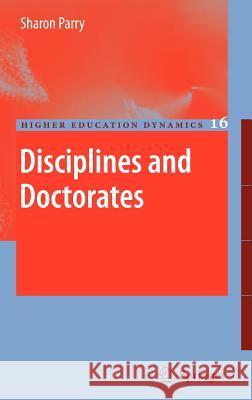Disciplines and Doctorates » książka
Disciplines and Doctorates
ISBN-13: 9781402053115 / Angielski / Twarda / 2006 / 164 str.
Attainment of a research doctorate is a pinnacle of academic achievement. In any national system, the PhD demonstrates the ability to produce original, significant and important knowledge in a specialised field. Its attainment signifies the capacity to produce and reproduce knowledge at the most advanced level. Advice about how to achieve a PhD usually falls short of relevance because the ways of creating and reporting knowledge differ dramatically from one disciplinary field and specialisation to another. Yet supervisors and doctoral candidates alike know that there are certain protocols or parameters, often inexplicit in nature, that govern its achievement and that need to be mastered. This book sets out to explore the nature of these protocols and parameters, linking them to the cognate characteristics of fields of knowledge and to social conventions constraining how new knowledge is reported. Disciplines and Doctorates provides a detailed analysis of the experience of learning to make new knowledge at the level of the research doctorate. It does so from the perspectives of both supervisors and candidates across a range of disciplines in different university settings. It draws principally upon a very large-scale, empirical investigation at a number of Australian universities. It also provides a comparative account of doctoral study in different national systems. This book can be counted as making a significant contribution to the scholarly literature on postgraduate education. It is however more than that: individual doctoral students and supervisors as well as University Graduate Schools will be able to benefit from the book s practical advice, and it also promises to be a valuable addition to courses on Teaching and Learning. A striking feature of the book is the use of quotations from numerous interviews. The author uses these skilfully to illustrate her analysis, bringing added life to an already well written and readable text Professor Tony Becher"











